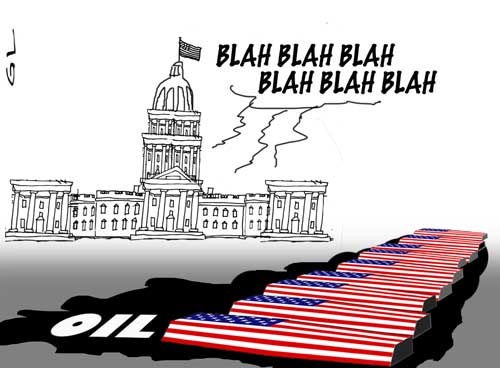Search
Recent comments
- three packages....
1 hour 11 min ago - russian oil.....
1 hour 18 min ago - crime against peace....
9 hours 30 min ago - why is Germany supporting the ukrainian nazis?....
10 hours 42 min ago - sanctioning....
13 hours 26 min ago - politico blues....
14 hours 6 min ago - gender muddles....
14 hours 26 min ago - war crimes and war crimes....
17 hours 15 min ago - new yourp....
17 hours 55 min ago - piracy not included....
18 hours 24 min ago
Democracy Links
Member's Off-site Blogs
more smells from the outhouse .....

‘At 10 a.m. on April 4, 2001, representatives of 13 environmental groups were brought into the Old Executive Office Building for a long-anticipated meeting. Since late January, a task force headed by Vice President Cheney had been busy drawing up a new national energy policy, and the groups were getting their one chance to be heard.
Cheney was not there, but so many environmentalists were in the room that introductions took up "about half the meeting," recalled Erich Pica of Friends of the Earth. Anna Aurilio of the U.S. Public Interest Group said, "It was clear to us that they were just being nice to us."
A confidential list prepared by the Bush administration shows that Cheney and his aides had already held at least 40 meetings with interest groups, most of them from energy-producing industries. By the time of the meeting with environmental groups, according to a former White House official who provided the list to The Washington Post, the initial draft of the task force was substantially complete and President Bush had been briefed on its progress.
In all, about 300 groups and individuals met with staff members of the energy task force, including a handful who saw Cheney himself, according to the list, which was compiled in the summer of 2001. For six years, those names have been a closely guarded secret, thanks to a fierce legal battle waged by the White House. Some names have leaked out over the years, but most have remained hidden because of a 2004 Supreme Court ruling that agreed that the administration's internal deliberations ought to be shielded from outside scrutiny.
One of the first visitors, on Feb. 14, was James J. Rouse, then vice president of Exxon Mobil and a major donor to the Bush inauguration; a week later, longtime Bush supporter Kenneth L. Lay, then head of Enron Corp., came by for the first of two meetings. On March 5, some of the country's biggest electric utilities, including Duke Energy and Constellation Energy Group, had an audience with the task force staff.
Rep. Henry A. Waxman (D-Calif.), chairman of the House Oversight and Government Reform Committee, who unsuccessfully pushed for details of the meetings, said it is "ridiculous" that it has taken six years to see who attended the meetings. He described the energy task force as an early indicator of "how secretively Vice President Cheney wanted to act."
Waxman said he was not surprised to see the prevalence of energy industry
groups on the list of meetings. "Six years later, we see we lost an
opportunity to become less dependent on importing oil, on using fossil
fuels, which have been a threat to our national security and the well-being
of the planet," he said.
- By Gus Leonisky at 20 Jul 2007 - 6:49am
- Gus Leonisky's blog
- Login or register to post comments
smell grows to stench .....
‘In-depth investigation shows how Vice President Dick Cheney pressured federal energy regulators to conceal evidence of widespread market manipulation by energy companies during the California electricity crisis in 2001.’
Cheney Suppressed Evidence In California Energy Crisis
Downright scary
By Eugene Robinson Friday, July 20, 2007; Page A19
One hopes the leader of the free world hasn't really, truly lost touch with objective reality. But one does have to wonder.
Last week, George W. Bush invited nine conservative pundits to the White House for what amounted to a pep talk, with the president providing the pep. Somehow I was left off the list -- must have been an oversight. But some columnists who attended have been writing about the meeting or describing it to colleagues, and their accounts are downright scary.
Prognosticatorus erroneousii...
Why Bush Is A Loser
By David Corn
Tuesday, July 17, 2007; 7:45 PM
Who knew Bill Kristol had such a flair for satire?
How else to read his piece for Outlook on Sunday, in which he declared, "George W. Bush's presidency will probably be a successful one"? Surely Kristol, the No. 1 cheerleader for the Iraq war, was mocking himself (and his neoconservative pals) for having been so mistaken about so much. But just in case his article was meant to be a serious stab at commentary, let's review Kristol's record as a prognosticator.
On Sept. 18, 2002, he declared that a war in Iraq "could have terrifically good effects throughout the Middle East." A day later, he said Saddam Hussein was "past the finish line" in developing nuclear weapons. On Feb. 20, 2003, he said of Saddam: "He's got weapons of mass destruction.... Look, if we free the people of Iraq we will be respected in the Arab world." On March 1, 2003 -- 18 days before the invasion of Iraq -- Kristol dismissed the possibility of sectarian conflict afterward. He also said, "Very few wars in American history were prepared better or more thoroughly than this one by this president." He maintained that the war would cost $100 billion to $200 billion. (The running tab is now about half a trillion dollars.) On March 5, 2003, Kristol said, "We'll be vindicated when we discover the weapons of mass destruction."